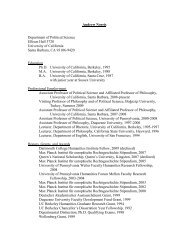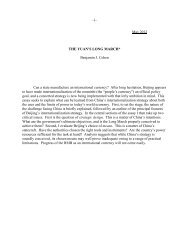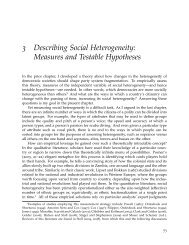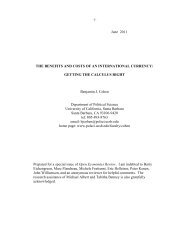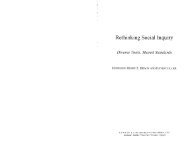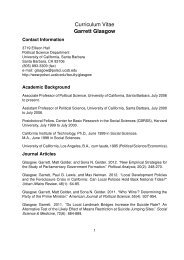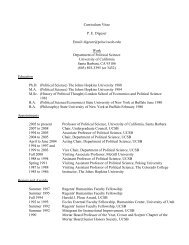Are Niche Parties Fundamentally Different from Mainstream Parties ...
Are Niche Parties Fundamentally Different from Mainstream Parties ...
Are Niche Parties Fundamentally Different from Mainstream Parties ...
You also want an ePaper? Increase the reach of your titles
YUMPU automatically turns print PDFs into web optimized ePapers that Google loves.
528 JAMES ADAMS, MICHAEL CLARK, LAWRENCE EZROW, AND GARRETT GLASGOW<br />
Ezrow, Lawrence. 2005. “<strong>Are</strong> Moderate <strong>Parties</strong> Rewarded in<br />
Multiparty Systems? A Pooled Analysis of Western European<br />
Elections, 1984–98.” European Journal of Political Research<br />
44(6):881–98.<br />
Golder, Matt. 2003. “Explaining Variation in the Success of Extreme<br />
Right <strong>Parties</strong> in Western Europe.” Comparative Political<br />
Studies 36(4):432–66.<br />
Green, Donald P., Soo Yeon Kim, and David H. Yoon. 2001.<br />
“Dirty Pool.” International Organization 55(2):441–68.<br />
Grofman, Bernard. 2001. “The Impact of Electoral Systems on<br />
Party Polarization.” Typescript.<br />
Groseclose, Tim. 2001. “A Model of Candidate Location When<br />
One Candidate Has a Valence Advantage.” American Journal<br />
of Political Science 45(4):862–86.<br />
Hearl, Derek. 2001. “Checking the Party Policy Estimates: Reliability.”<br />
In Mapping Policy Preferences: Estimates for <strong>Parties</strong>,<br />
Electors, and Governments 1945–1998, ed. Ian Budge,<br />
Hans-Dieter Klingemann, Andrea Volkens, Judith Bara,<br />
and Eric Tanenbaum. Oxford: Oxford University Press,<br />
pp. 111–25.<br />
Hillebrand, Ron, and Galen Irwin. 1999. “Changing Strategies:<br />
The Dilemma of the Dutch Labor Party.” In Policy, Office,<br />
or Votes? How Political <strong>Parties</strong> in Western Europe Make Hard<br />
Decisions, ed. Wolfgang Muller and Kaare Strom. Cambridge:<br />
Cambridge University Press, pp. 112–49.<br />
Hinich, Melvin, and Michael Munger. 1989. “Political Investment,<br />
Voter Perceptions, and Candidate Strategy: An Equilibrium<br />
Analysis.” In Models of Strategic Choice in Politics,ed.<br />
Peter Ordeshook. Ann Arbor: University of Michigan Press,<br />
pp. 49–68.<br />
Hinich, Melvin, Christian Henning, and Susumu Shakano.<br />
2004. “Proximity versus Directional Models of Voting: <strong>Different</strong><br />
Results but One Theory.” Presented at the annual<br />
meeting of the Public Choice Society, Baltimore.<br />
Hsiao, Cheng. 2003. Analysis of Panel Data. 2nd ed. Cambridge:<br />
Cambridge University Press.<br />
Huber, John. 1989. “Values and Partisanship in Left-Right Orientations:<br />
Measuring Ideology.” European Journal of Political<br />
Research 17(5):599–621.<br />
Hug, Simon. 1995. “Third <strong>Parties</strong> in Equilibrium.” Public Choice<br />
82(1–2):159–80.<br />
Kedar, Orit. 2004. “The Micro Foundations of (Vertically) Divided<br />
Government: Evidence <strong>from</strong> Germany.” Presented at<br />
the annual meeting of the American Political Science Association,<br />
Chicago.<br />
Kedar, Orit. 2005. “When Moderate Voters Prefer Extreme <strong>Parties</strong>:<br />
Policy Balancing in Parliamentary Elections.” American<br />
Political Science Review 99(2):185–200.<br />
Kitschelt, Herbert. 1994. The Transformation of European Social<br />
Democracy. New York: Cambridge University Press.<br />
Laver, Michael, Kenneth Benoit, and John Garry. 2003.<br />
“Extracting Policy Positions <strong>from</strong> Political Texts Using<br />
Words as Data.” American Political Science Review 97(2):<br />
311–31.<br />
Lewis-Beck, Michael. 1988. Economics and Elections: The Major<br />
Western Democracies. Ann Arbor: University of Michigan<br />
Press.<br />
Lin, Tse-Min, Yun-han Chu, and Melvin Hinich. 1996. “Conflict<br />
Displacement and Regime Transition in Taiwan: A Spatial<br />
Analysis.” World Politics 48(4):453–81.<br />
Lin, Tse-Min, James Enelow, and Han Dorussen. 1999. “Equilibrium<br />
in Multicandidate Probabilistic Spatial Voting.” Public<br />
Choice 98(1–2):59–82.<br />
Markus, Gregory B. 1979. Analyzing Panel Data. Beverly Hills:<br />
Sage Publications.<br />
McDonald, Michael, and Ian Budge. 2005. Elections, <strong>Parties</strong>,<br />
Democracy: Conferring the Median Mandate.Oxford:Oxford<br />
University Press.<br />
McDonald, Michael, and Sylvia Mendes. 2001. “Checking the<br />
Party Policy Estimates: Convergent Validity.” In Mapping<br />
Policy Preferences: Estimates for <strong>Parties</strong>, Electors, and Governments<br />
1945–1998, ed. Ian Budge, Hans-Dieter Klingemann,<br />
Andrea Volkens, Judith Bara, and Eric Tanenbaum. Oxford:<br />
Oxford University Press, pp. 127–42.<br />
McDonald, Michael, Sylvia Mendes, and Ian Budge. 2004.<br />
“What <strong>Are</strong> Elections For? Conferring the Median Mandate.”<br />
British Journal of Political Science 34(1):1–26.<br />
McGann, Anthony. 2002. “The Advantages of Ideological Cohesion:<br />
A Model of Constituency Representation and Electoral<br />
Competition in Multiparty Democracies.” Journal of Theoretical<br />
Politics 14(1):37–70.<br />
Meguid, Bonnie. 2005. “Competition between Unequals: The<br />
Role of <strong>Mainstream</strong> Party Strategy and <strong>Niche</strong> Party Success.”<br />
American Political Science Review 99(3):347–60.<br />
Merrill, Samuel, III, and Bernard Grofman. 1999. A Unified Theory<br />
of Voting: Directional and Proximity Models. Cambridge:<br />
Cambridge University Press.<br />
Merrill, Samuel, III, and James Adams. 2002. “Centripetal Incentives<br />
in Multicandidate Elections.” Journal of Theoretical<br />
Politics 14(3):275–300.<br />
Miller, Gary, and Norman Schofield. 2003. “Activists and Partisan<br />
Realignment in the United States.” American Political<br />
Science Review 97(2):245–60.<br />
Paldam, Martin. 1991. “How Robust Is the Vote Function?<br />
A Study of Seventeen Nations Over Two Decades.” In<br />
Economics and Politics: The Calculus of Support, ed. Helmut<br />
Norpoth, Michael Lewis-Beck, and Jean-Dominique<br />
Lafay. Ann Arbor: University of Michigan Press, pp. 9–<br />
31.<br />
Pelizzo, Riccardo. 2003. “Party Position or Party Direction? An<br />
Analysis of Party Manifesto Data.” West European Politics<br />
26(2):67–89.<br />
Pennings, Paul. 1998. “Party Responsiveness and Socio-<br />
Economic Problem-Solving in Western Democracies.” Party<br />
Politics 4(3):393–404.<br />
Powell, G. Bingham. 2000. Elections as Instruments of Democracy.<br />
Majoritarian and Proportional Visions. New Haven: Yale<br />
University Press.<br />
Powell, G. Bingham, and Guy Whitten. 1993. “A Cross-National<br />
Analysis of Economic Voting: Taking Account of Political<br />
Context.” American Journal of Political Science 37(2):391–<br />
414.<br />
Przeworski, Adam, and John Sprague. 1986. Paper Stones: A<br />
History of Electoral Socialism. Chicago: University of Chicago<br />
Press.<br />
Quinn, Kevin, and Andrew Martin. 2002. “An Integrated Computational<br />
Model of Multiparty Electoral Competition.” Statistical<br />
Science 17(4):405–19.<br />
Roemer, John. 2001. Political Competition: Theory and Applications.<br />
Cambridge, MA: Harvard University Press.



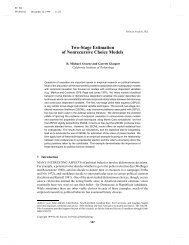
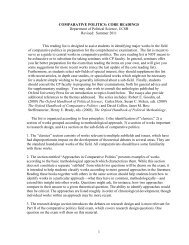
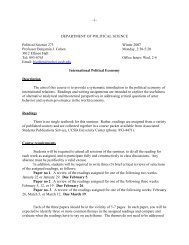
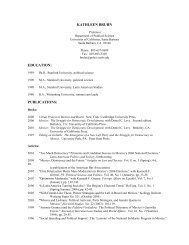
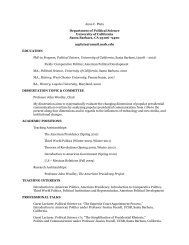
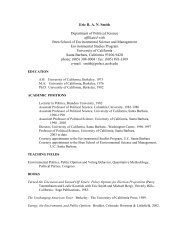
![Curriculum Vitae [abbreviated] John T. Woolley Professor of Political ...](https://img.yumpu.com/25423597/1/190x245/curriculum-vitae-abbreviated-john-t-woolley-professor-of-political-.jpg?quality=85)
